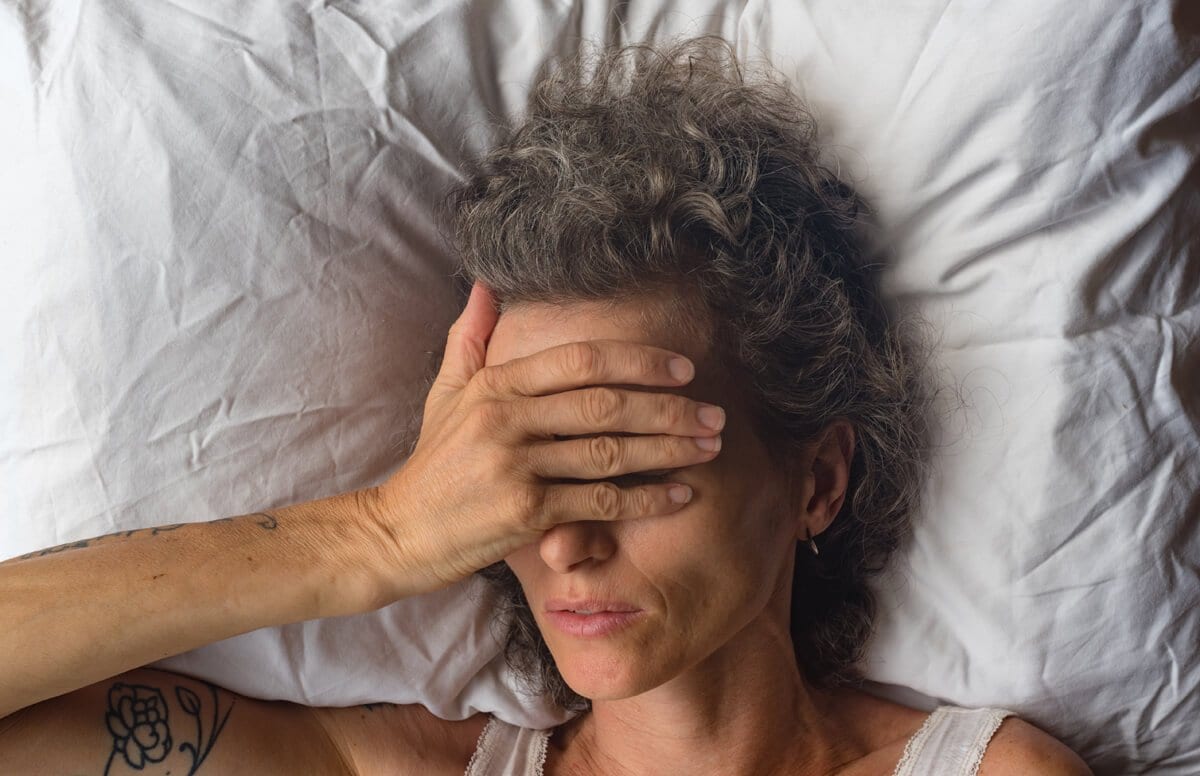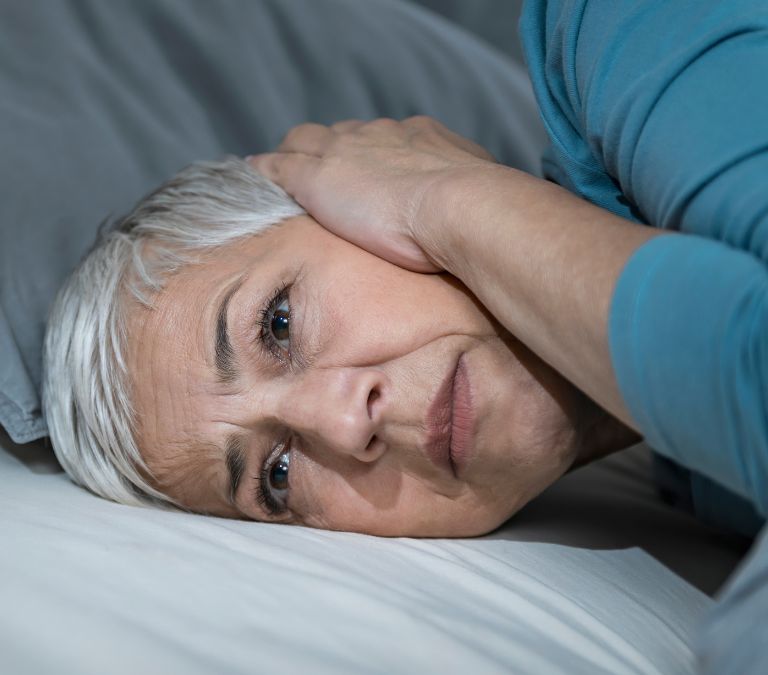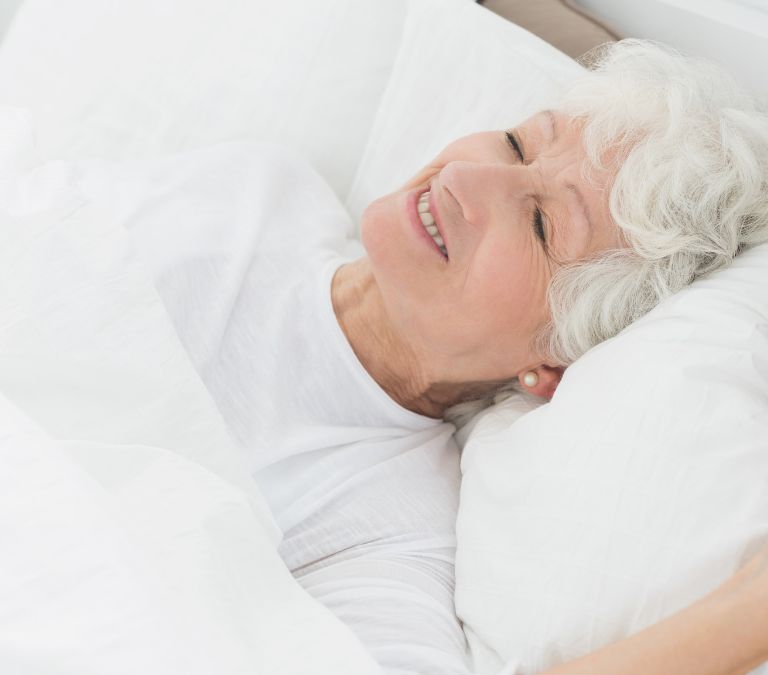Adequate rest enables productivity in carrying out essential duties. However, as people age, their performance rate might decrease gradually because of several factors.
Everyone needs at least 7 hours of sleep to be healthy, as insufficient rest could cause detrimental effects on the body. Do you experience a lack of sleep after reaching menopause age? Does your low sleep duration affect your mental health? Is there any connection between menopause and sleep? This article helps to examine the connection between menopause and sleep.
Note that despite the numerous advantages of healthy sleep habits, excess rest could cause detrimental effects on one’s mental health. Most medical experts recommend at least 7 hours of sleep daily as you might decide to take a short nap during the day, depending on your workload.
More than 75% of adult women complain about sleep difficulty after reaching menopause age. Before going into details about menopause-induced sleep problems and recommended solutions by professionals, first, understand the importance of having a healthy sleeping habit.
Menopause and Sleep – Highlighting The Importance of Healthy Sleeping

You don’t have to work hard to look refreshed and healthy. Research proves that getting desired rest is as necessary as engaging in a workout routine or eating a balanced diet.
My colleagues and friends often ask which product makes meals always glow. I only tell them to maintain a good diet. Well, I am ready to share that secret with you. Below are common reasons why I always stick to healthy sleeping habits;
Weight Loss
When you sleep less than 7 hours as recommended by professionals, there is a high certainty of gaining more weight. A study indicates that adults that spend less than 7 hours at night rest are 41% prone to obesity. This figure is even worst with menopausal women. This article discusses menopause and weight gain
Moreover, longer sleep reduces obesity by 6% as another analysis shows sleeping affects hormone secretion as increased sleep facilitates the high release of leptin hormone and low Ghrelin. Leptin hormone makes one feel full, while Ghrelin causes hunger.
Improvement in Productivity
Taking a short nap when I feel exhausted during the day makes me more productive at work, but some might abuse the importance of healthy sleep and rest for long hours.
In other words, sleep helps to improve brain concentration and facilitate more productivity. A 2020 study shows doctors with moderate rest are less likely to experience medical errors as it also enhances students’ problem-solving skills.
Enhancement in Athletic Performance
Are you surprised that healthy sleep increases athletic performance? My gym class members recognize me as one of the best athletes. My reason for this success is enough rest.
Before beginning my early morning routine, I take enough time to relax and feel refreshed, as research shows it reduces one’s risk of injury. Consider a sleep routine as an athlete, and you will always feel motivated.
Strengthening of the Heart
When last did you go for a health check-up? I understand sometimes, an overwhelming workload might deter you from monitoring your heart status. However, healthy sleep ensures the heart is in an appropriate state.
Studies show sleeping fewer than 7 hours increases the risk of heart disease and high blood pressure, as another report claims fewer than 5 hours of daily rest increases the chance to 61%.
Reduction of Depression
Within the last decade, the rate of depression has continued to surge. Yes, people have worries about settling bills, meeting society targets, etc. remember that good mental health is vital before accomplishing any dream. Most experts link depression to sleeping disorders or anxiety.
Effects of Lack of Healthy Sleeping Habit

There are certain effects if you do not cultivate a good sleeping habit. Some of the effects are explained below.
Increased chances of a car accident
Driving requires a degree of concentration. If you don’t sleep enough, there is a risk of car accidents. Similarly, fewer sleeping hours make the eyes tired, causing unexpected injuries.
Weakening of the Immune System
The immune system helps to protect the body against harmful microbes. When the immunes are weak, there is a high risk of contracting an illness. An effective way to keep the body protector active is to have enough rest.
You will contact harmful microbes when your body cannot protect you from the common cold and flu. Remember, stay healthy by having at least 7 hours of sleep.
Reduction in Sex Drive
I noticed a low urge to copulate with my partner for a while and sometimes the sex is painful. Then, I spoke with my doctor, who advised sleeping well and drinking enough water. After practicing the advice, my sex drive has drastically increased as I feel emotionally connected to my soulmate.
Poor Body Posture
Tiredness could affect balance, thereby causing poor body posture. Resting well enhances agility and performing daily tasks swiftly.
Hypertension
Not getting enough rest can lead to the heart overworking, causing hypertension. However, this ailment is treatable but could get complicated if not monitored.
Studies show sleeping fewer than 5 hours increases hypertension risk compared to regular 7 hours of sleep. A clinical psychologist Dr. Michael Grander said moderate rest revitalizes the body and prevents several heart diseases. This article further explains the risks of menopause and hypertension.
Common Menopause-Induced Sleep Problem
I know that feeling of wanting a successful night’s rest after a hectic day but finding it difficult to close your eyes for at least 2 hours. More than half of women above 45 years experience sleeping problems. Although a chronic lack of night sleep might be problematic, it is more difficult during menopause.
A discussion with a 50-year-old friend shows that she relies on medications to be able to shut her eyes and have night rest. Some days when she didn’t take drugs, there might be fatigue, mood swings, etc.
Before discussing the ways to tackle menopause-induced sleep issues, here are common sleep problems;
Hot Flashes and Night Sweats
Most women experience hot flashes during menopause and perimenopause. Similarly, if you think of chemotherapy or surgery to remove your ovaries, you experience hot flashes.
If you don’t know the meaning of hot flash, it is that feeling of heat, sweating, or a flushed face. However, there is still ongoing research on the different causes of this phenomenon. However, we can associate hot flashes with the change in body circulation.
If you are within the menopause age group and experience sporadic rapid heart rate, your skin surface widens to break out a sweat. The difference between hot flash and night sweat is that the latter occurs at night and makes it challenging to rest as hot flash causes redness to the skin (face and neck).
Menopause does not mean you get hot flashes, as I know some mature adult women never have them. In addition, hot flashes’ duration differs as some have them for ten years, others are less.
Currently, there is no immediate solution to hot flashes during menopause. However, you can avoid some substances that can trigger the condition. Some include alcohol, heat, cigarette smoke, spicy foods, etc.
When you have hot flashes and night sweats, chill your pillow with a bucket of water after ensuring you wear lightweight clothing. Another effective practice is slow and deep breathing for 15 minutes every morning and evening.
Mood Disorders
We (females) are indeed emotional beings. However, because menopause involves significant change, there is a higher tendency for mood disorders. This aging period is a complete phase where you don’t have to worry about childbearing and keeping up the midlife attraction.
A survey with a group of older women indicates the feeling of losing an excellent body shape and attention can cause aggressiveness in some ladies. Still, an intelligent woman will use it as an advantage to develop herself by acquiring more wisdom and confidence.
During perimenopause, some notice hot flashes and mood swings when there is a decrease in estrogen hormone. After almost a year of not experiencing monthly blood flow is when menopause happens.
Research by the North American Menopause Society (NAMS) confirms the first indication of menopause transition is mood swings. The raging decrease in hormones causes changes like insomnia, feeling weepy, irritability, anxiety, depression, etc.
When night sweats are intense, there is a certainty of waking up sporadically during sleep as it could result in irritability, foggy thinking, and other swings. Difficult menopause swings have a history of depression, premenstrual syndrome(PMS), or other health issues.
In addition, emotional problems may arise if unsuccessful relationships, stressful days, or low living standards exist. Sometimes, these individuals might not understand why they find it challenging to hold simple thoughts, feel enraged, recall someone’s name, forget things easily, etc.
If you have an elderly one, peer, or relative that experiences these changes, you might notice their picking solace in drugs or alcohol. Unfortunately, these choices could worsen their state, so help address this issue by providing more attention.
Snoring and Sleep Apnea
The dramatic hormonal change in every woman comes with unwelcome symptoms. Most individuals think consequences like hot flashes, irregular menstruation, mood changes, etc., are the only signs of aging because they are more visible. Snoring and sleep apnea also deserve attention as they could worsen with time.
The release of estrogen and progesterone hormone in the body maintains the throat muscle tone. In other words, without proper hormonal release to keep the airway free and toned, there is a tendency to develop sleep apnea.
Reduced weight occurs during menopause as some begin to add more fat around the neck region. Scientific research proves that a large neck for aging women contributes to obstructive sleep apnea (OSA).
My study discovered that not all cases of hot flashes and OSA are linked to menopause, as some are associated with underlying health issues. However, medical practitioners still see them as menopause indicators.
Similarly, most women ignore sleep apnea after the initial years, so to help doctors identify an appropriate diagnosis, they might ask about snoring during sleep. Loud snoring is an indicator of sleep apnea.
If you are above the middle-age as a woman, I will advise observing signs like frequent night urination, daytime drowsiness, restlessness, and insomnia. Always inform your doctor of these changes to get the best treatment.
Insomnia
When there is a low level of estradiol or melatonin hormone in a woman’s body, insomnia sets in. If you notice these changes, quickly enlist for hormone therapy as this natural occurrence causes changes to people’s routines and lifestyles.
Similarly, complementary therapies like hypnosis and aromatherapy have been effective for others facing sleep disruption. Common factors that affect getting enough night rest include; environment, medical condition, age, etc.
Statistics by NSF confirm that more than 60% of women experience signs of insomnia. While significant causes can be associated with sweating and hot flashes, some experts add underlying mood disorders as a cause.
Before concluding on possible reasons for sleeplessness, identify if the problem relates to menopause hormones, depression, or anxiety. If the cause of insomnia is emotional factors, then book a schedule with a therapist as they will provide appropriate mental health care.
In addition, sticking to sleep hygiene practices helps instead of relying on medication that could complicate your health. Sleep practices are a natural way to tackle insomnia.
Slow Metabolism
Menopause transition makes us lose shape, which might be unattractive. Medical practitioners have not been able to identify the primary cause of these changes as it’s pretty tricky separating simultaneous aging from hormonal transition.
A 2019 research by the Study of Women’s Health Across the Nation (SWAN) confirms that during the final period of menstruation, there is more fat gain and less muscle mass. This trend of more fat continues till one’s last period.
In another study, regular sleep interruption or hormonal level suppression reduces body energy, leading to more fat storage or weight gain.
Exercises that Relief Menopause-induced Sleep
The following activities help numerous women tackle their menopause-induced sleep problems. You can consider giving them a try soon;
Swimming
Do you struggle with sleeping at night? Consider enrolling in a swimming class and notice significant changes. If you think your age prevents your enrollment, I will advise you to reconsider your decision.
By swimming, you reduce the pressure level of the body and increase mental health, which significantly influences a sleep routine. Your presence in the pool environment can trigger stressors melting away from the body.
Taking a Stroll
The reason why I will always recommend strolling for aged women is that it requires less stress. If your body cannot adapt to a long hour exercise routine, make it a habit to walk around your neighborhood for at least 15 minutes.
This tip has been practiced for different individuals. You can decide to carry along your music player or pet. Taking a stroll has enormous benefits on one’s mental and physical health.
Dancing
Dancing sounds funny. Well, I love to dance. I consider trying it sometimes. I always dance to my favorite music twice a week after work. It makes me glow and refreshes me.
You don’t have to take medications before you look good and have a successful night’s rest. It requires shaking your body for 20 minutes and noticing significant changes in your sleeping habit.
Yoga or Gymnastics
There are numerous special yoga classes for adult women. Consider registering for any of them. Yes, yoga requires a degree of flexibility as the age factor might deter you from performing some exercises. The primary purpose of signing up for yoga is to burn excess fat. When the body feels refreshed, there is a high certainty of more hormone release, facilitating sleep.
Sexual intercourse
Apart from the pleasant feeling one enjoys from sex, it is an effective sleep remedy. During intercourse, oxytocin and prolactin hormones are released. They create a sense of relaxation, thereby facilitating sleep. Note that these hormonal changes can lead to masturbation as more than 50% of women confirm that the orgasm from self-servicing also enhances quality sleep.
Foods that Relieve Menopause-induced Sleep
As you age, be careful with what you ingest into your body to avoid complications or sleeping problems. Below are common food type that helps to relied menopause-induced sleep problem;
Soy Milk and Soybeans

Every postmenopausal woman who experiences hot flashes should consider including soy milk and beans in their diet. This food group is an excellent choice because they contain low fat and reduce hot flashes in adult women.
Wheat, Millet, and Barley
A study confirms that grains are rich in vitamin B and fiber. Mood disorder is a symptom of sleep problems in adult women. With enough Vitamin B and fiber, you will benefit from an improved nervous system and mood.
Thyme, Parsley, Sage
Consuming spicy foods like thyme and parsley helps reduce hot flashes but don’t limit them as nutritionists advise adding mild seasoning like cardamom, basil, etc. Interestingly, it helps improve food taste.
Chocolate
Before consuming the whole chocolate at home, know there is a limit to it. Medical practitioners suggest that having milk chocolate in the morning and night reduces fats & blood glucose levels.
Water
Water reduces skin dryness, fatigue, muscle cramp, etc. When your body is well hydrated, it will be easier to teach healthy sleeping habits. Similarly, try to stay away from alcohol and consume more fruits.
Salmon, Sardine, Mackerel
Seafood is essential to remedy sleep problems because they contain Omega-3s, which help keep the heart healthy. As women grow older, there are higher chances of heart disease, so you need a diet that keeps one healthy. Similarly, these oily fish reduce mood disorders.
Supplement/Vitamins that Help with Menopause-induced Sleep
Magnesium
Magnesium is a game-changer for women during menopause because the body doesn’t have enough. At a particular stage, magnesium facilitates numerous functions, so it is required in high demand.
When there is enough magnesium in the body, there is reduced blood pressure, improved heartbeat, low diabetes, and constipation ease. Sometimes, it helps with joint pain, improves sleep, and calms anxiety. You can get high magnesium from pumpkin seeds, bananas, cashews, tuna, and yogurt.
Vitamin A
Getting Vitamin A includes; retinol form(animal products) and carotenoid form(fruits and veggies). This vitamin helps improve vision, skin health, and the immune system.
Although there is ongoing research on the significance of vitamin A on menopause symptoms, it helps reduce body stress and facilitate thyroid function, which may improve sleep.
Good sources of Vitamin A are beef, sweet potato, mango, red pepper, grapefruit, avocados, and carrots. Please be careful with your daily intake as it could cause vomiting, headache, blurry vision, or nausea.
Calcium
As you enter perimenopause, the need for more calcium increases because it maintains nerve & muscle function and keeps strong bones. Osteoporosis is a condition when the bone becomes weakened because of age. With enough calcium, you can feel agile to perform daily tasks and sleep successfully.
Avoid excess calcium intake because it could cause gastrointestinal symptoms and cardiovascular disease. In addition, high calcium absorbs other nutrients, which leads to a deficiency. Adult women above 50 should take 1,200mg, while younger ones stick with 1,000mg. Calcium-rich food sources include; sardines, spinach, cheese, and tofu.
Probiotics
More than a trillion microbes are in the body that aid digestion, mental health, and physiological functions. Lack of probiotics causes poor diet, illness, and stress, reducing sleep.
Consider taking this nutrient today if you don’t want to experience constipation, bloating, or any vaginal-related issue. Good sources of probiotics include tempeh, bread, kefir, pickles, and sauerkraut.
Turmeric
Turmeric contains anti-inflammatory properties as its ingredients boost heart health and reduce depression. Aside from disease protection after menopause, turmeric eases joint pain.
Familiar food sources include; stew, curry dishes, etc. Getting turmeric from food might not be enough, so consider taking supplements.
Conclusion
Aging is a natural phenomenon and an excellent opportunity to acquire more knowledge. After identifying your menopause-induced sleep problem, use the above-recommended exercise and supplement for solutions, as you don’t have to undergo much stress to have a successful night’s rest.







